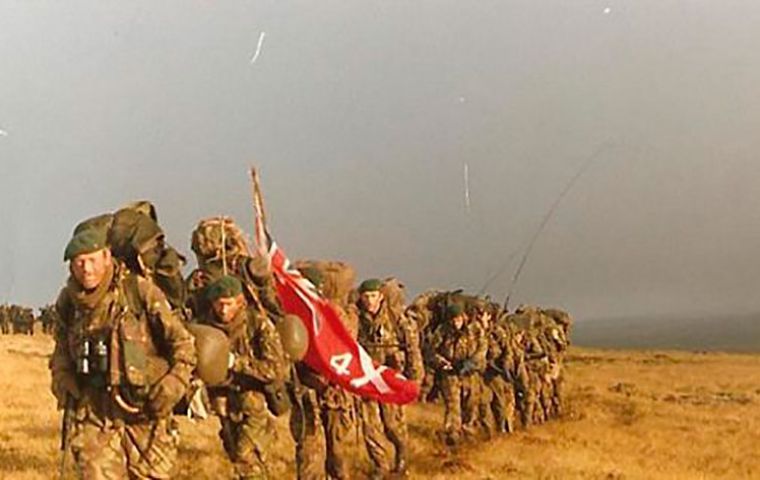MercoPress. South Atlantic News Agency
Locking in Stanley by land, sea and air, was stalemate for Argentine occupation and Falklands Liberation

British Armed Forces fought their way towards the capital of the Falkland Islands, Stanley, in a series of battles on the evening of 11 June 1982. The objective were the mounts Two Sisters and Harriet, securing the high ground next to Stanley facilitating the definitive surrender of the Argentine occupying force and Liberation of the Falklands
Ian Gardiner, 45 Commando Royal Marines, had an objective for X-Ray Company - capture one of the Two Sisters mountains. 45 Commando fought the battle supported by 105mm guns of 29 Commando Regiment and the 4.5 inch guns of HMS Glamorgan.
There were two start lines, being Y and Z companies to the north west of the northern sister (Summer Days) and X company, which spearheaded the attack, to the west of the southern sister (Long Toenail).
“We knew that time would be of the essence because HMS Glamorgan, wonderful asset that she was, was in danger of being hit by an Exocet missile if she were found there in daylight,” he said.
“We knew there was a land-based missile system on the coast, waiting to pluck off plums just like her. However, we also knew it only had a daylight capability. So as long as it was dark, Glamorgan would be fine but if we were still fighting our battle at dawn, she would have to leave.”
He added that when the Marines got themselves “into the rocks” they “were not going to lose”.
“They'd missed their chance to really inflict damage upon us getting across the open ground,” he said. “My Marines were not going to lose a battle, gutter fight, in the rocks, halfway up a mountain in the dark, in a snowstorm. This is what we do.”
After taking the first third of the ridge on ‘Long Toenail’ X company were pinned down for 3/4 hours by heavy enemy fire at which time the commanding officer committed Z and Y companies.
It took Z and Y companies two hours, under heavy machine gun and mortar fire to secure ‘Summer Days’. The Z troop commander Lieutenant Clive Detour won the Military Cross by rallying his 8 troop and leading it forward at bayonet point, shouting “Zulu, Zulu, Zulu” being their battle cry.
After capturing the Two Sisters 45 Commando came under artillery fire from surrounding Argentine positions. They dug-in and enjoyed the Argentine rations and blankets, as non of their kit had reached them and a frost had set-in.
The Marines lost 8 men in the battle and the Argentines 20, with 54 taken prisoner.
HMS Glamorgan stayed on station beyond her exit time, supporting Y company, and as a result was hit by a land-based Exocet missile with the loss of 14 lives.
The assault on Mount Harriet commenced on the night of June 11th. The attack was led by 42 Commando of the Royal Marines, supported by 29 Commando Royal Artillery and HMS Yarmouth with her 4.5 inch guns.
The Argentine forces on Harriet were well prepared in secure defensive positions, and had the great advantage of height. The land to the west and south had been ‘sown’ with mines.
The planned attack on the Two Sisters to the north of Harriet by 45 Commando was to take place at the same time, and to avoid any interference with this action, it was decided to attack from the south, the Welsh Guards securing the start line.
The battle commenced with an extended bombardment from HMS Yarmouth after which L and K companies mounted a two pronged attack from the south, supported by very accurate artillery fire. Once the Argentine troops were engaged J company negotiated the minefield and attacked from the west.
The Argentine troops fought well and were advantaged by supporting sniper fire from Goat Ridge to the north and the provision of second generation night sights - British forces only having cumbersome first generation sights.
The attack was an example of good planning, deception and surprise. 1,000 rounds were fired by supporting artillery and mortar units. 300 Argentine prisoners were taken, with 18 fatalities. 42 Commando had two fatalities.
Having started to capture the high ground surrounding Stanley, it was a matter of hours before the war was over, in effect 14 June Liberation Day.




Top Comments
Disclaimer & comment rules-

Read all commentsSoldiers get all the fun!
Jun 12th, 2022 - 12:32 pm 0The Argentinians shouldn't have been there. Regardless how they fought, they're still scum to me.
Well done to the British.
Commenting for this story is now closed.
If you have a Facebook account, become a fan and comment on our Facebook Page!